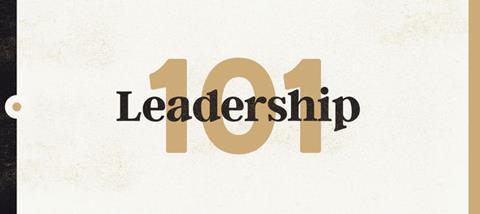
Don’t get me wrong, I’m sure you’re a very nice person(!) but the problem with me leading me is that it’s all on me. No one is checking up on me to make sure I’m doing it right, and no one tells me off if I’m doing it wrong. No one is responsible for leading myself but me! Not only is it hard, it’s also incredibly important, because no one wants to follow a leader who isn’t living up to the standards they set for everyone else. Simply put, you cannot lead others until you first lead yourself.
What we are talking about here is self-leadership. This means that we are taking active responsibility for our own spiritual growth and personal development. It means that we are being faithful stewards of our own potential, becoming more fully the person that God created us to be. Mark Batterson writes: “Our potential is God’s gift to us, what we do with it is our gift back to him.” This is the driving principle behind self-leadership. So to get us started on the self-leadership journey, here are three potential-maximising questions to consider.
Am I actively developing my spiritual gifts?
In his second letter to Timothy, Paul writes: “I remind you to fan into flame the gift of God, which is in you” (2 Timothy 1:6). If I were to ask you to describe your top three spiritual gifts, would you be able to tell me? If not, then how can you be fanning them into flame? Remember the parable of the talents (Matthew 25:14-30)? It’s on us to identify and multiply the gifts God has given us. How do we do that?
Step one: identify Take a spiritual gifts assessment, do a personal Bible study on the spiritual gifts, ask a trusted friend or mentor what they see in you.
Step two: multiply Read around your area of giftedness, get alongside a more mature person with similar gifts and learn from them. But most importantly, give it a go! Your gifts cannot grow unless you exercise them; it’s a self-leadership responsibility.
How challenged am I right now?
Ask yourself: am I under-challenged, appropriately challenged or over-challenged? I know I’m under-challenged when nothing I do scares me anymore, when I’ve got enough time to send a few snaps, scroll through Twitter, take a bit of extra time on the toilet and still get the job done! I can cover it with my current capacity, I’m cruising. This is bad news. We don’t bring our best when under-challenged. We get bored, sleepy, slow, we don’t bring our best ideas - and it’s not only us that suffers, it’s our young people as well.
But that’s not the only danger zone. Some of you reading this are over-challenged. You take work home every night, your personal devotions keep getting squeezed out, you don’t have time to exercise, no matter how hard you work you never get it all done, your work has become a duty rather than a joy… you’re over-challenged. This is the place where burn-out happens, where relationships crumble and where sin seems more appetising and temptation harder to resist. Sound familiar? It’s up to you to re-adjust the balance. You need to know that a slower day is not coming and no one will do it for you; it’s a self-leadership responsibility.
Where you want to live is in the appropriately challenged zone. This is where you’re on exciting and scary adventures with Jesus, you’re doing things that seem too big for you and are causing you to throw yourself into a place of dependency on God. You’re stretched to the point of growing, but not to the point of breaking. You’re developing but not dying! What is your challenge level right now?
Have I identified replenishment streams in my life?
Have you identified the things that fill you up and are you giving yourself enough time to practise them? If not, take out a journal and write them down. But think carefully - there is a difference between really replenishing and merely stopping! I’m learning that some of the things we’re doing to relax aren’t giving us true rest. If you’ve ever spent a day in your pyjamas binging on Netflix and felt worse for it you know what I’m talking about! So, what are the things that really renew you? Who are the people who build you up? Which activities give you life? Identify them and prioritise them; it’s a self-leadership responsibility.
I love how Parker J Parmer describes this: “I have become clear about at least one thing: self-care is never a selfish act - it is simply good stewardship of the only gift I have, the gift I was put on this Earth to offer others. Anytime we can listen to our true self and give it the care it requires, we do so not only for ourselves, but for the many others whose lives we touch.”
Perhaps the greatest gift we can give to our young people is a model of the person we are praying they will become. So let’s prioritise self-leadership that we might become more fully the people God created us to be. Because you can’t lead others until you first lead yourself.




























